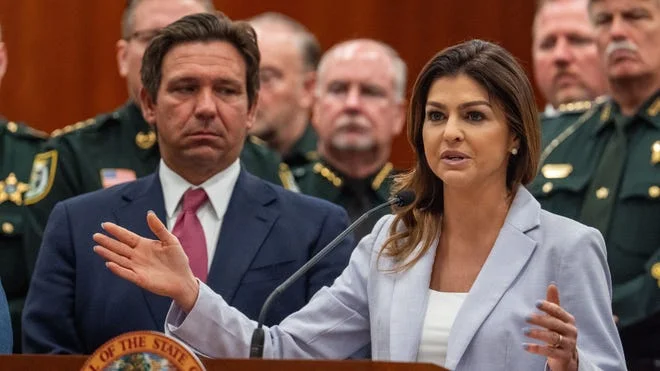
Could Florida’s Charity Scheme Hide a Million-Dollar Deception?
In a twist that has Florida's political landscape buzzing, allegations of misused funds and potential federal crimes are casting a shadow over a state initiative meant to uplift communities. At the heart of the controversy is the Hope Florida Foundation, linked to Governor Ron DeSantis and First Lady Casey DeSantis, raising questions about transparency in public funding and its impact on American governance.
The saga began with a $67 million settlement from Medicaid giant Centene, where $10 million was diverted to the Hope Florida Foundation instead of state coffers. This money, intended for public welfare, allegedly flowed to nonprofits that funneled it into campaigns against a recreational marijuana ballot measure. Florida State Rep. Alex Andrade has been vocal, accusing key figures like former DeSantis chief of staff James Uthmeier of involvement in what could be money laundering or wire fraud. "It is readily apparent that a culture of neglect, incompetence and entitlement exists within the halls of the governor’s office," Andrade stated during a heated committee meeting.
Four former federal prosecutors, with a combined 86 years at the Department of Justice, analyzed the case for news outlets and found strong grounds for investigation. Charles Blau, a veteran in money laundering cases, emphasized, "Once you have Medicaid funds involved, those funds belong to the state and not to the charity or political action committees." They pointed to potential charges like theft of government funds, mail fraud, and conspiracy, which could lead to decades in prison. Stefan Cassella, a Medicaid fraud expert, argued that diverting these funds defrauds both Florida and the federal government, highlighting the settlement's structure as a red flag.
The timeline is telling: In September, Centene sent $10 million to Hope Florida as part of the deal. Within days, the foundation granted $5 million each to two nonprofits, which then contributed to Uthmeier's political committee opposing the marijuana amendment. Uthmeier, now Florida's attorney general, and DeSantis officials deny any wrongdoing, labeling the accusations as "nonsense" and a media-driven narrative. Yet, experts like Paul Pelletier warn that misallocating federal healthcare dollars is a serious crime, potentially inviting scrutiny from the U.S. Department of Justice.
This isn't just a financial misstep; it's a political powder keg. With DeSantis term-limited and his wife eyed as a future gubernatorial candidate, the scandal exacerbates tensions with Republican leaders like House Speaker Daniel Perez. Critics argue it undermines Hope Florida's mission of reducing government aid dependency, turning a program praised for innovation into a symbol of potential abuse. As Bill Cotterell noted in his commentary, DeSantis' defensive tactics, including attacking inquisitors, could escalate the crisis rather than resolve it.
In the end, the Hope Florida controversy underscores the risks of blending charity with politics, potentially eroding public trust in state institutions. Will this lead to a federal probe, or will it fade as internal politics? The implications for Florida's governance and the DeSantis legacy are profound, leaving taxpayers to question where their money truly goes.
As this story unfolds, what do you think: Is this a case of political maneuvering gone wrong, or something more sinister? Share your views in the comments below and help us explore the deeper layers of this unfolding drama.